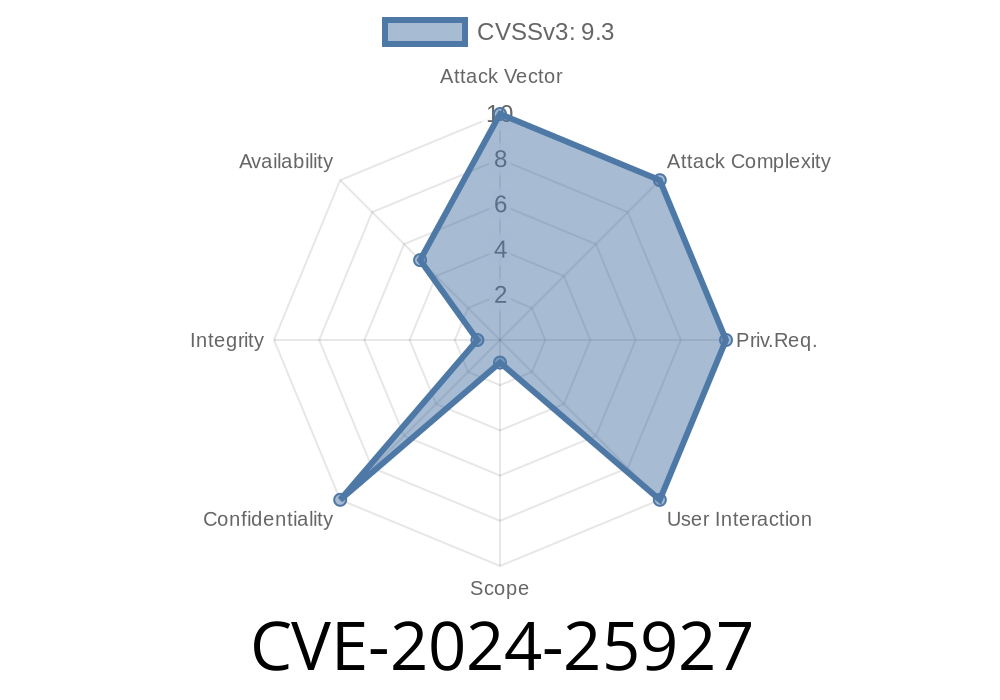TL;DR:
CVE-2024-25927 is an SQL Injection vulnerability in the WordPress plugin "postMash – custom post order" by Joel Starnes. This flaw can allow attackers to access or manipulate your WordPress site's database just by sending crafted requests. It's found in all versions up to 1.2. and exposes critical data to attackers.
What is postMash – custom post order?
"postMash – custom post order" is a popular WordPress plugin by Joel Starnes, designed to let users drag-and-drop posts to reorder them. Many bloggers and site admins install it for its simple interface and functionality.
Plugin page:
https://wordpress.org/plugins/postmash/
What is CVE-2024-25927?
CVE-2024-25927 is a tracked security vulnerability officially described as:
> Improper Neutralization of Special Elements used in an SQL Command ('SQL Injection') vulnerability in Joel Starnes postMash – custom post order from n/a through 1.2. allows remote attackers to execute arbitrary SQL commands.
How Does It Happen?
The postMash plugin interacts with your WordPress database to update post order. In versions up to 1.2., the code responsible for updating post positions doesn't sanitize or prepare input coming from the user. That means malicious values can slip straight into SQL queries.
Here’s a (simplified) vulnerable code example
// Vulnerable part in postMash-old.php (simplified)
$order = $_POST['order']; // This comes directly from user, untrusted
$sql = "UPDATE $wpdb->posts SET menu_order = '$order' WHERE ID='$post_id'";
$wpdb->query($sql);
The $order value from the HTTP POST request is used directly in the SQL statement. If someone submits '1 OR 1=1' instead of a number, the entire SQL logic breaks down, and the attacker controls the query.
1. Attacker Prepares Data
The attacker crafts a request as an authenticated user (with post editing capabilities) to submit malicious SQL code:
Example POST data for exploitation
order=1, menu_order=(SELECT user_pass FROM wp_users WHERE ID=1)
2. Sending Malicious Data
They send this data via tools like Burp Suite, Postman, or even the browser’s developer console on request modification.
3. Malicious Query Runs
The database executes the injected code. In some cases, it could reveal sensitive data (like admin password hashes) or even allow attackers to manipulate posts in unintended ways.
Sample Exploit Request (using curl)
curl -X POST http://targetsite.com/wp-admin/admin-ajax.php \
-d "order=1 OR 1=1" \
-b "wordpress_logged_in=..." # login cookie needed
How to check?
Go to your WordPress admin panel, check Plugins > Installed Plugins, and see the version number for postMash – custom post order.
How to Fix It
Immediate solution:
Disable or uninstall the plugin if you don’t need it.
- Restrict admin/editor access to trustworthy users only.
Permanent fix:
- Upgrade to a patched version (if/when available).
Example of proper sanitation using WordPress methods
$order = intval($_POST['order']); // Convert to integer
$sql = $wpdb->prepare(
"UPDATE $wpdb->posts SET menu_order = %d WHERE ID = %d",
$order,
$post_id
);
$wpdb->query($sql);
References & Further Reading
- Official CVE report on NIST
- WPScan Advisory Database *(if/when available)*
- postMash – custom post order on WordPress.org
- SQL Injection explanation: OWASP Top 10: Injection
Conclusion
SQL Injection remains one of the most dangerous, easy-to-exploit security holes in web applications. CVE-2024-25927 in the postMash plugin is a textbook case: always validate and sanitize your inputs, and keep your plugins up to date!
Timeline
Published on: 02/28/2024 13:15:09 UTC
Last modified on: 02/28/2024 14:06:45 UTC
